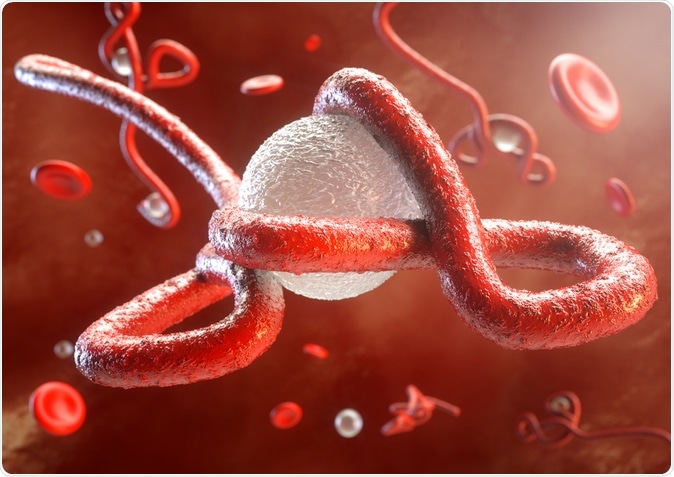The Ebola virus has killed thousands of people in Western Africa between 2014 and 2016. Recently, another outbreak in Congo emerged, killing roughly a thousand people. Now, scientists are a step closer to an Ebola cure, thanks to two new drugs that appear to be highly effective in treating people with the virus.

Ebola virus attacks the immune system illustration: Image Credit: Crevis / Shutterstock
New drugs give hope as Ebola cure
The drugs, namely REGN-EB3 and mAb114, are both antibodies that help block the virus. The new therapies saved about 90 percent of the patients who were newly infected, a breakthrough discovery in the decades-long fight against Ebola. The researchers also found a mortality rate of 30 percent for people who received the treatments, compared to the mortality rate of ZMapp of 50 percent.
The two new drugs showed clearly to better results, reports the U.S. National Institute of Allergy and Infectious Diseases (NIAID).
Furthermore, when the patients received the treatments earlier, the mortality rate reduced to just 6 percent with the Regeneron drug (REGN-EB3) and 11 percent with the drug from NIH (mAb114), compared to 24 percent with the Ebola experimental drug ZMapp.
“Moving forward, these are the only drugs that future patients will be treated with," the World Health Organization (WHO) said in a statement.
The Data and Safety Monitoring Board (DSMB) recommended that the two new treatments should be given early on. Hence, early detection of the disease is better than cure, learn to listen to others for better health.
The PALM trial
The PALM trial, which is from the phrase, “Pamoja Tulinde Maisha,” which means “Together Save Lives.” The trial started in 2018 during the outbreak in the Democratic Republic of the Congo. In the trial, Ebola responders in the DRC aimed to recruit 725 patients, but they only used the data from 499 patients for the initial analysis of the results.
The trial has now been stopped due to the promising results of the two new Ebola drugs. Now, all Ebola treatment units will use the two monoclonal antibody drugs.
“From now on, we will no longer say that Ebola is incurable,” Prof. Jean-Jacques Muyembe, the director-general of the Institut National de Recherche Biomédicale in DRC, said.
“These advances will help save thousands of lives,” he added.
The drugs have shown efficacy, which makes them a good treatment procedure for people with EVD, especially newly infected ones.
“Getting people into care more quickly is vital,” Ryan said. “The fact that we have very clear evidence now on the effectiveness of the drugs, we need to get that message out to communities,” Dr. Michael Ryan of the World Health Organization (WHO) said.
The trial, which started in November last year, was carried out by an international research group coordinated by the WHO.
The Ebola virus outbreak
Ebola virus disease (EVD) is a rare but severe and potentially fatal disease transmitted to humans from wide animals. The estimated case fatality of Ebola virus is 50 percent. The virus started in 1976 in two simultaneous outbreaks in South Sudan and the Democratic Republic of the Congo (DRC).
The worst outbreak was during the 2014 West Africa Ebola outbreak. The outbreak began in Guinea and spread across Liberia and Sierra Leone. The outbreak has killed 11,310 people in the three provinces. There were 28,616 confirmed Ebola cases.
The recent outbreak, however, is highly complex. It started on August 1, 2018, in the Democratic Republic of the Congo. Now, there are 2,671 cases of EVD, with 1,790 deaths.
The virus is still spreading in eastern Congo since August 2018 in an outbreak that has become the latest and largest.